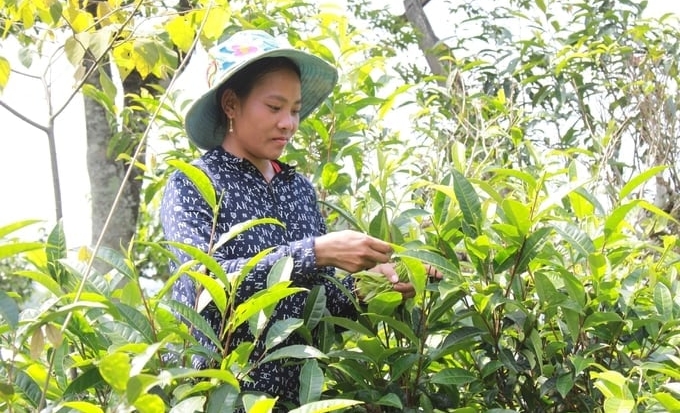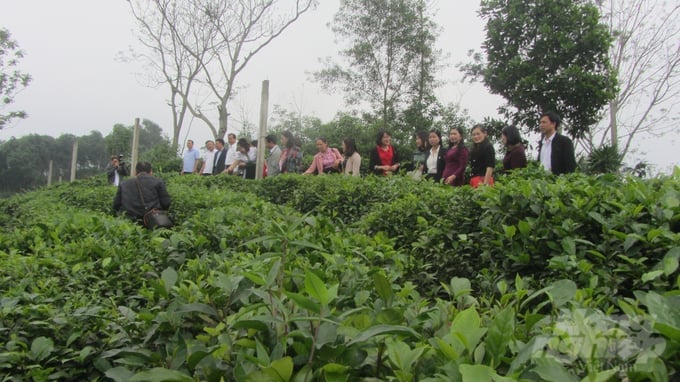May 21, 2025 | 00:38 GMT +7
May 21, 2025 | 00:38 GMT +7
Hotline: 0913.378.918
May 21, 2025 | 00:38 GMT +7
Hotline: 0913.378.918
Recently, in Tuc Tranh commune, Phu Luong district (Thai Nguyen), Thai Nguyen University of Agriculture and Forestry organized a workshop "Developing and replicating organic agriculture - a direction for sustainable agriculture and adapt to climate change". Many scientists from domestic and international ministries, branches, and academies participated in the workshop, along with representatives of some local state management agencies and farmers in Thai Nguyen and Son La provinces.

Many agricultural production areas of our country today still maintain traditional production methods that are very convenient for organic agriculture.
At the workshop, scientists emphasized that climate change is humanity's biggest challenge in the 21st Century, seriously impacting all aspects of people's lives globally. Vietnam is also one of the countries likely to be severely affected by climate change. Accordingly, replicating organic agricultural models is considered one of the sustainable solutions to adapt to climate change.
Dr. Pham Hai Vu (Institute of Policy and Strategy for Agricultural and Rural Development) shared that the International Federation of Organic Agriculture Movements (IFOAM) was established in 1972 in Versailles (France) for communication and information exchange related to the principles and practices of organic agriculture. To date, 188 countries have implemented 96,000,000 hectares of organic agricultural production, accounting for 2.2% of the total global cultivated area. Countries like the United States, Australia, and the European Union (EU) have a breakneck pace in developing organic agriculture.
"Vietnam has mainly introduced chemicals into agricultural production for about 50 years, so quite a few localities still practice traditional agriculture. Vietnam is also a country with many distinct ecological regions and diverse populations. Rich and diverse biological organisms... These are favorable conditions for developing organic agricultural production, but to export these products, it is necessary to achieve international organic certifications", Dr. Pham Hai Vu pointed out.

The workshop attracted many experts, scientists, and businesses to discuss the difficulties and advantages of developing organic agriculture in our country. Photo: Hai Tien.
Prof. Dr. Dao Thanh Van, Vice President of the Vietnam Organic Agriculture Association, said that by 2023, all 63/63 provinces and cities in the country have built organic agricultural production models. Our country's export turnover of organic agricultural products currently reaches about USD 335 million annually, with nearly 1,000 hectares of crops certified for organic production by foreign organizations. Typically, Vinasamex Cinnamon Company of Yen Bai, Ecolink Company and Hung Cuong Company, Shan Tuyet organic tea produced in Lao Cai and Ha Giang...
In particular, TH Group with the motto "Praise mother nature", "For public health" has become the first and only enterprise in Vietnam to convert dairy herds to organic farming, TH True milk fresh milk has achieved European organic certification. Also, 95 vegetable and fruit products of the Group's FVF International Clean Fruit and Vegetable Production and Supply Joint Stock Company achieved Organic certification from Europe and America.
Mr. Nguyen Ta, Director of Thai Nguyen Department of Crop Production and Plant Protection, said that Thai Nguyen is the starting place and the locality with the country's largest organic agricultural production area. By the end of 2023, in terms of applying organic production standards alone, the province had implemented nearly 180 hectares, mainly for tea trees, edible mushrooms, and medicinal mushrooms. This result is thanks to the Provincial Party Committee and People's Committee having a resolution and decision on approving the implementation of the Project "Development of key agricultural products of Thai Nguyen province for the period 2021 - 2025, orientation to 2030", which prioritizes funding to support farmers in developing organic, VietGAP and safe agricultural production.

Delegates visited the organic tea production model at Khe Coc Cooperative (Tuc Tranh, Phu Luong, Thai Nguyen). Photo: Hai Tien.
Dr. Nguyen Tri Hieu, Vice Rector of Thai Nguyen University of Agriculture and Forestry, pointed out that smart agricultural production through technical measures that consider the compatibility with natural characteristics and ecological conditions of plants is also a way to adapt to climate change.
Dr. Nguyen Thi Ngoc Dinh (Vietnam National University of Agriculture) said that organic agricultural production helps reduce greenhouse gas emissions, contributing to combating climate change. Therefore, the state needs to issue soon planning for organic agricultural production areas to attract investors to concentrate organic agricultural production in large areas, making product inspection, supervision, certification, and off-take more convenient, accelerating the process of forming a domestic organic agricultural product market.
"Currently, our country has many concepts about organic and VietGAP, such as organic agriculture, organic production, VietGAP, and VietGAP, making it difficult for farmers and consumers to distinguish and produce or buy products that meet organic standards," Dr. Dinh stated the situation.
Translated by Huong Giang

(VAN) Khanh Hoa is investing over 545 billion VND to develop 240 hectares of high-tech marine aquaculture in order to guarantee a consistent supply of seafood exports and achieve the USD 1 billion target.

(VAN) Minister of Agriculture and Environment Do Duc Duy held a meeting with Soopakij Chearavanont, Chairman of C.P. Group, on May 15.
/2025/05/16/3800-0-nongnghiep-143756.jpg)
(VAN) Suntory PepsiCo Vietnam coordinated with the Ministry of Education and Training to implement an education program on water conservation, reaching nearly 1 million primary school students nationwide.

(VAN) Vietnam’s TH Group officially put its high-tech fresh milk processing plant into operation in the Russian Federation, marking a historic moment as the first TH true MILK cartons were produced in Russia.

(VAN) Use of high-quality broodstock and biotechnology is regarded as the most effective approach to ensuring sustainable and economically viable shrimp aquaculture ahead of climate change and the emergence of increasingly intricate disease patterns.

(VAN) Carbon farming is a form of agricultural practices that helps absorb more greenhouse gases than it emits, through smart management of soil, crops, and livestock.

(VAN) This is a key content of the Memorandum of Understanding recently signed between the Vietnam Fisheries Society and Kunihiro Inc of Japan.